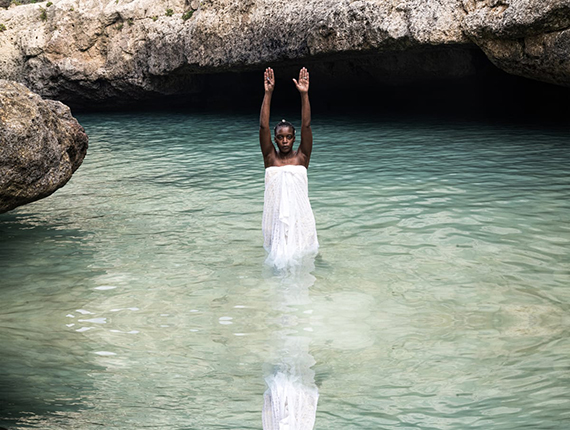
Adama Delphine Fawundu »
go-slow
Exhibition: 15 Nov – 21 Dec 2024
Fri 15 Nov 18:00
Hesse Flatow
77 Franklin Street
NY 10013 New York
+1-646-892-3032
info@hesseflatow.com
www.hesseflatow.com
Tue-Sat 11-18
HESSE FLATOW is pleased to announce go-slow, Adama Delphine Fawundu’s second solo presentation with the gallery featuring a collaborative painting with the artist’s sister Frances Fawundu, photography, and mixed media works as part of her ongoing exploration of indigeneity, lineage, and its diasporic permutations.
Mining her Mende, Krim, Bamileke, and Bubi origins, Fawundu draws from a personal archive of objects, images, conversations, and memories collected over her travels, which she assembles and transforms in discrete, yet interconnected bodies of work. Rooted in photographic processes, patterns from her grandmother’s garra textiles appear spliced with nature, silkscreened over handmade papers or dyed fabrics, and given corporality through adornments with raffia, hair, and healing herbs. Within this alchemical collaging of disparate media, the artist’s body functions as a symbolic layer – a site in which hereditary knowledge, an attunement to one’s surroundings, and creative reflection coalesce in pursuit of a physical and spiritual connection with the world.
Water pervades throughout Fawundu’s works, both symbolically as well as materially through form and movement. It not only operates as an expanse separating the artist from her extended family in Sierra Leone, but also as a conducting agent, making one’s journey across it fertile ground for Fawundu’s introspections. Like the solutions and inks used to expose and develop her imagery, water’s saturating and diluting abilities analogizes the passing down and encoding of cultural information over generations. As Fawundu reminisces about her own ancestry, often her memories involve the imagining of new possibilities, both to fill in for absences she feels she has missed out on, and more broadly to think outside of herself in contemplating larger communities and collective movements.
Reproducing archives outside of her own and reinvigorating them through interventions, Fawundu contemplates the colonial time period of her parents, pursuing trails of familial connections. Early twentieth century portraits of local Sierra Leoneans taken by the photographer Alphonso Lisk-Carew serve as portals into an ancestral realm. Bodily specters pervade throughout the images and objects within Fawundu’s practice, most commandingly in a large-scale hanging sculptural piece entitled "Klin wata no boku, duya, I du so!", which quilts together water sachets. While devoid of their contents, each unit functions as a vessel, individualized in absentia through the bite marks of their drinkers, as well as materially, through the stuffing of beads, cyanotyped fabrics, and cowrie shells invoking Fawundu’s artistic vernacular.
The belief that no human being is a blank slate, and that we are here to learn from the person before us, underscores the cumulative logic of Fawundu’s practice. Her ritualized language-making employs repetition as a means to extend her process, which in turn prescribes a prolonged reading. The title of the exhibition - go-slow – is a call to inaction, taking its cues from the deliberate slowing down of productivity as a form of protest against extreme capitalism. In today’s accelerated society, Fawundu shows us the importance of taking time to think about how one occupies space and relates to others as a sustainable practice and regimen of self-care.